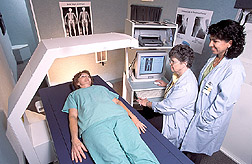Feb 22 2005
|

The scientists screened potential participants in the bone study by using a measurement tool called a dual x-ray absorptiometer, or DXA, to measure bone mineral density. Photo shows nutritionist Fariba Roughead (right) using a DXA for an earlier nutrition study.
|
Agricultural Research Service (ARS) scientists first compared high-meat protein diets with low-meat protein diets. Now, they've compared animal-protein diets with vegetable-protein diets. This "sequel" study rocks the foundation, again, of a commonly held belief that high-protein diets can be bad for bones.
ARS scientists in the Grand Forks [N.D.] Human Nutrition Research Center conducted the study. The findings were published in January in The Journal of Clinical Endocrinology & Metabolism. ARS is the U.S. Department of Agriculture's chief scientific research agency.
Nutritionists Zamzam (Fariba) Roughead and Janet Hunt, with colleagues, carefully controlled the diets of 13 healthy, postmenopausal women. Two seven-week experimental diets were provided to each of the volunteers. A two-week break was scheduled between each of the two diet phases.
Both diets provided 15 percent of energy--or daily caloric intake--from protein, a percentage that represents average U.S. consumption. One diet contained mostly meat protein, and the other substituted 25 grams of high-isoflavone soy protein for an equivalent amount of the meat protein provided daily. The remainder of each diet was mixed to represent typical daily intakes of calcium and other nutrients.
The scientists measured biomarkers in blood and urine collected during each seven-week diet phase and found no indications of differences in calcium or bone metabolism after eating either diet. Moreover, the soy-protein-substituted diet did not change the absorption or excretion of calcium.
Some scientists long have theorized that high-meat protein diets can leach calcium from bones. Others theorize that the phytate, a component of soy protein, can interrupt mineral absorption in general.
The study's findings suggest that calcium absorption from these two important sources of dietary protein is similar.